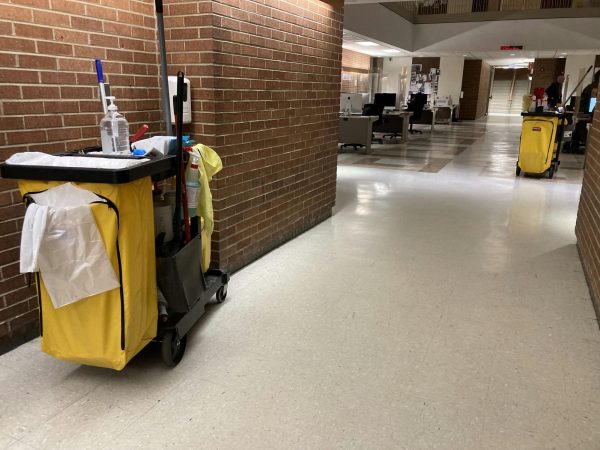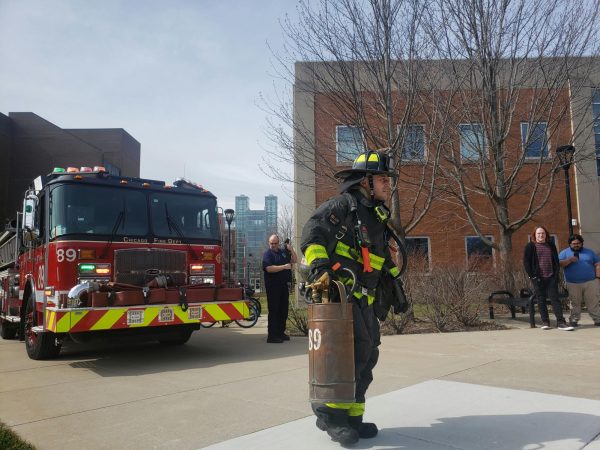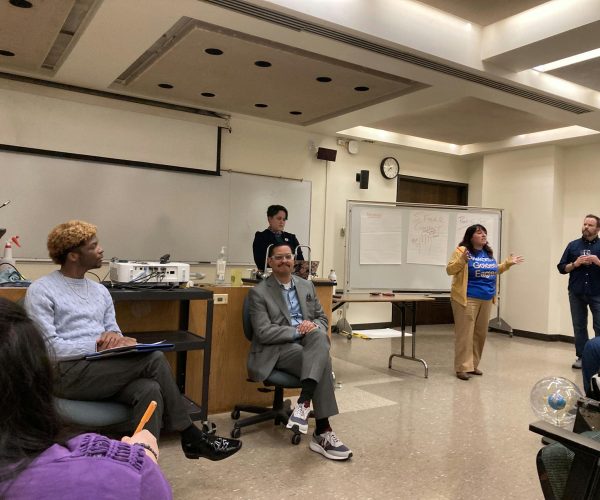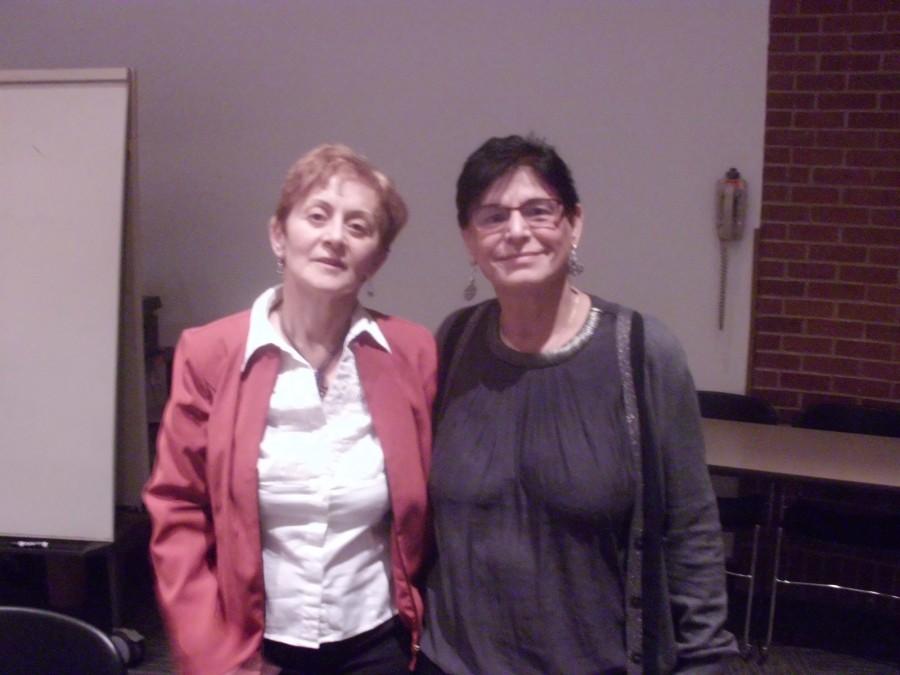Feminists Tear Borders
Dr. Rabab Ibrahim Abdulhadi (right) and Dr. Simona Sharoni (left) have travelled across seven different campuses on the west coast, and plan to have talks at different campuses along the east coast as well.
Inspired by peace and justice, Israeli and Palestinian feminists came together in Lech Walesa Hall’s lecture room to educate the NEIU community on violence against Palestinians and the misrepresentations of identity that add insult to injury.
“What is the subtext that the newspapers are trying to tell us,” asked Dr. Rabab Ibrahim Abdulhadi, associate professor of Ethnic Studies, Race and Resistance Studies, Arab and Muslim Ethnicities and Diasporas Initiative at San Francisco State University.
She explained the way media coverage mirrored the profiles of the three Muslim students in Chapel Hill and their neighbor who murdered them, Craig Stephen Hicks.
Abdulhadi continued, “We are told he supports gay rights and women’s right to choose. And when I read that, I was wondering, what does it mean? What is the subtext that we are given by saying ‘this is who he is’, as opposed to what? What are the people he killed? They’re Arabs, Muslims. Are they supposed to be then, exceptionally homophobic? Are they supposed to be against women’s right to choose?”
Dr. Simona Sharoni, professor and department chair of women and gender studies at Plattsburgh State University of New York spoke of the importance of a feminist analysis on the Israeli-Palestinian conflict because of a lack of female talking heads.
She said that it goes beyond the biological aspect of being a woman. It’s about the need for “someone that has an analysis that links multiple oppression that connects the dots, connects injustices that are based on class, gender, political orientation, ethnicity, that looks at systemic structures. Makes connections between racism in the United States, in our neighborhoods, in the Israeli attack on Gaza.”
Those types of connections were made evident in Abdulhadi’s speech. She spoke of how dominant institutions continue to perpetuate structures of racism in their actions, stating the shootings in both Chapel Hill and Ferguson are not isolated incidents but results of those oppressive states.
“When does a life become valuable? And why do we, those who come from indigenous and marginalized communities, need to always demonstrate the worthiness of the victims of our communities to justify our demand for justice. You know the same story also came out with Michael Brown around Ferguson, and all our dead,” said Abdulhadi.
She then pointed to President Barrack Obama’s behavior where he immediately condemned the actions concerning Charlie Hebdo, but waited three days before offering condolences to the families of the three dead students. The lack of immediate action also falls on mainstream media which waited twenty-four hours before reporting, and questioned whether or not a response would be elicited had it not been for the massive campaign, numerous candlelight vigils, tweets and justice from communities.
“The same question arise again in the case of Ferguson because we know how it was treated before, and how it was treated later on,” said Abdulhaldi.
“Action” is what Abdulahldi said is needed to change the state of oppression. She asked the audience to see themselves in a hypothetical situation, where they witness another person being beat down in the street, and from that moment we make a “decision,” whether it is to leave or strand or get involved. In any case, there is no being neutral according to Abdulhaldi.
“Every single day the United States government gives 8.5 million dollars to Israel, so whether you get involved or don’t get involved, you are already involved, you are already implicated,” said Abdulhaldi.
She continued, “Should your tax dollars be going to participate in the further colonization and oppression of Palestinians or militarization of our communities?”
“If they gave them so much money, where does the money go? Most of the money, as well as additional sums go into rebuilding Israeli military. But it’s not simply a generous gift to Israel; all the kickbacks go into the U.S. military industrial complex. The attack on Gaza as previous attacks, is used by the U.S. weapon manufacturers as a testing ground for all their new equipment,” said Sharoni.
Sharoni added that violence doesn’t just end on the battlefield, violence inflicted on children is two to three times higher in families of military personnel, and the ratio is even higher in Israel. “My earlier research looked at that,” she said.
Sharoni went on to talk of her “pivotal transformation” in lieu of her exposure to Palestinian narratives and critical education at universities which was often not an easy experience to come across since Palestinian movements across campuses are often labeled “anti-Semitic” and are censored or prohibited.
“The accusation of anti-Semitism is one that troubles me because I am a daughter of a holocaust survivor,” said Sharoni as she continued to speak on two co-authors releasing a report on the measurement of anti-Semitism on college campuses without properly defining it.
“They started with a vantage point that anti-Semitism equals discomfort, to me it is a set of practices,” Sharoni said. Had it not been for discomfort of learning the truth of the confiscation of Palestinian land and the truth behind mainstream narratives, she would not have had that “pivotal transformation.”
Abdulhadi has faced her own challenges on campuses as she has been accused of terrorist and anti-Semitic behavior and has had an investigation launched on her before for those matters.
She told a story of an Israeli woman who spotted two guards forcing a Palestinian at a checkpoint to play his violin for them. The Israeli woman felt compelled to interject because it reminded her of Nazism as a child.
During the Q&A segment of the event, Abdulhaldi spoke of the boycott, divestment and sanctions campaign which is a global movement against Israeli Apartheid.
Sharoni closed the event, “We are going to ask critical questions,” she said, “and hold people who perpetuate the violence accountable. It’s motivated by a commitment to peace and justice that knows no boundaries and really looks at the injustices in Palestine as intertwined with other injustices in our communities and around the world.”
Emmanuel Gonzalez









rabab abdulhadi • Mar 16, 2015 at 10:07 am
Thanks Emmanuel for an excellent article